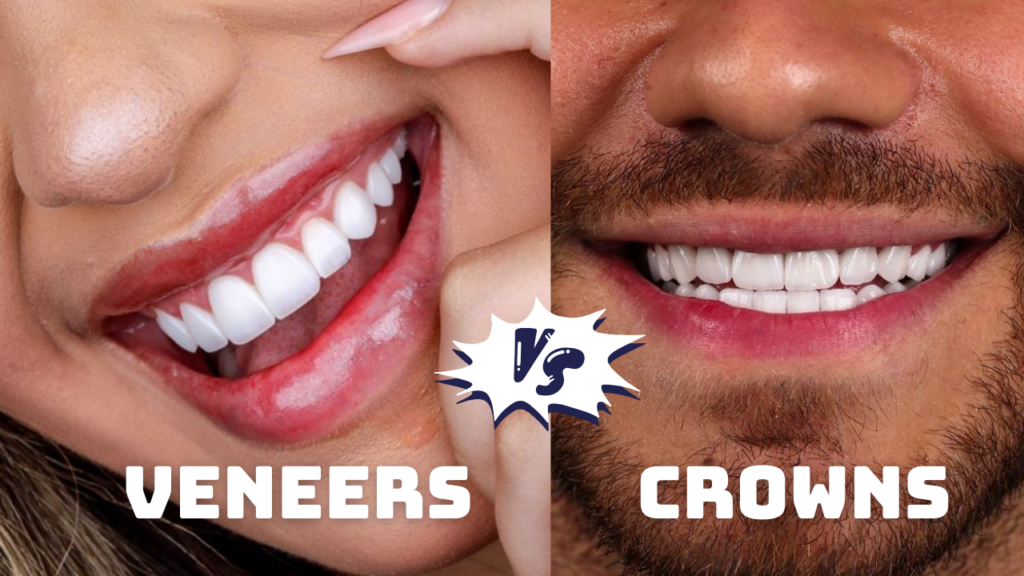Crowns vs. Veneers: Which Is Better for Your Teeth?
When considering restorative or cosmetic dental treatments, crowns and veneers are two popular options that enhance both functionality and aesthetics. However, choosing the right treatment depends on several factors, including the condition of your teeth, your aesthetic goals, and your long-term oral health needs. In this comprehensive guide, we will delve into the pros, cons, and ideal uses of crowns and veneers, helping you make an informed decision.
What Are Crowns?
Definition and Purpose of Dental Crowns
A dental crown, often referred to as a cap, is a restoration that covers the entire tooth. Crowns are typically used to restore teeth that are significantly damaged, weakened, or discolored. They provide strength and protection while mimicking the appearance of natural teeth.
Materials Used for Crowns
Crowns can be made from a variety of materials, including:
- Zirconia: Durable and aesthetically pleasing.
- Porcelain-fused-to-metal: Combines strength and natural appearance.
- Ceramic: Offers a natural look, especially for front teeth.
- Gold or metal alloys: Extremely durable but less commonly used for visible teeth.
When Are Crowns Necessary?
- Severely decayed or damaged teeth: Crowns provide structural integrity and protection.
- Root canal-treated teeth: They shield weakened teeth post-treatment.
- Broken or cracked teeth: Crowns restore strength and functionality.
- Aesthetic improvements: They can cover severe discoloration or deformities.
What Are Veneers?
Definition and Purpose of Dental Veneers
Dental veneers are thin, custom-made shells that are bonded to the front surface of teeth. They are primarily cosmetic, designed to improve the appearance of teeth without altering their underlying structure significantly.
Materials Used for Veneers
Veneers are commonly crafted from:
- Porcelain: Known for its durability and lifelike appearance.
- Composite resin: A more affordable option but less durable than porcelain.
When Are Veneers Ideal?
- Minor cosmetic imperfections: Chips, cracks, or irregularly shaped teeth.
- Mild discoloration: Ideal for stains that do not respond to whitening.
- Gap closures: Veneers can bridge minor spaces between teeth.
- Slight misalignments: They offer a non-invasive solution for a straighter smile.
Key Differences Between Crowns and Veneers
Coverage
- Crowns: Cover the entire tooth, providing 360-degree protection.
- Veneers: Only cover the front surface of the tooth.
Tooth Preparation
- Crowns: Require more significant removal of the tooth structure to fit properly.
- Veneers: Involve minimal tooth reshaping, preserving more of the natural structure.
Durability
- Crowns: Generally more durable and better suited for teeth under heavy stress, such as molars.
- Veneers: Less durable and more prone to chipping, especially with improper care.
Lifespan
- Crowns: Can last 10–15 years or more with proper maintenance.
- Veneers: Typically last 7–10 years but may require earlier replacement.
Cost
- Crowns generally cost more than veneers due to their materials and complexity, but prices vary based on location and material choice.
Pros and Cons of Crowns
Advantages
- Strength: Provide excellent durability, even for back teeth.
- Protection: Safeguard teeth from further decay or damage.
- Versatility: Useful for both restorative and cosmetic purposes.
Disadvantages
- Invasiveness: Require significant tooth structure removal.
- Potential sensitivity: Teeth may become sensitive after preparation.
- Higher cost: Crowns can be expensive depending on the material used.
Pros and Cons of Veneers
Advantages
- Aesthetic enhancement: Create a natural and appealing smile.
- Minimally invasive: Preserve more of the natural tooth structure.
- Quick results: Typically require fewer dental visits than crowns.
Disadvantages
- Fragility: More prone to chipping compared to crowns.
- Limited application: Not suitable for severely damaged or decayed teeth.
- Replacement needs: Require periodic replacement, increasing lifetime costs.
Factors to Consider When Choosing Crowns or Veneers
Condition of Your Teeth
If your teeth are severely damaged or decayed, crowns are the better option. For minor cosmetic flaws, veneers offer an effective solution.
Location in the Mouth
Crowns are better suited for molars and premolars due to their strength, while veneers work best for front teeth where aesthetics are a priority.
Aesthetic Goals
Veneers excel at creating a flawless smile with minimal intervention, making them ideal for cosmetic transformations.
Budget
Veneers tend to be less expensive initially, but their shorter lifespan may result in higher long-term costs compared to crowns.
Long-Term Maintenance
Both options require diligent oral hygiene and regular dental visits to ensure longevity.
Conclusion: Which Is Better for Your Teeth?
The choice between crowns and veneers depends on your specific dental needs and priorities. Crowns are ideal for restoring heavily damaged teeth and ensuring long-term durability, while veneers are perfect for achieving a stunning cosmetic transformation with minimal invasiveness. Consulting with a qualified dentist is crucial to determine the most suitable option based on your oral health and aesthetic goals.

